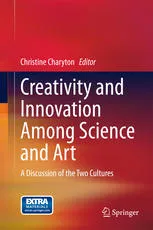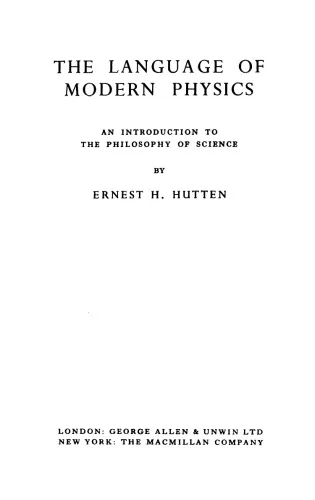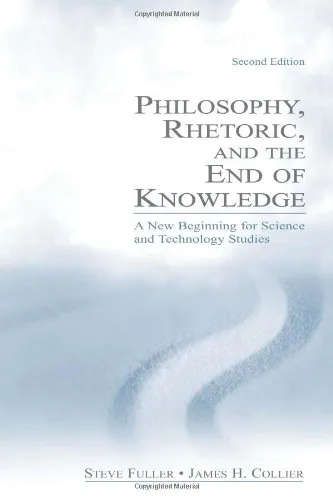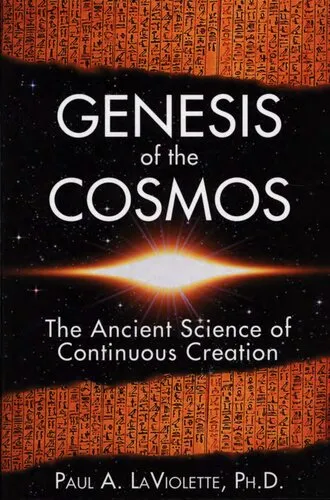EPSA Philosophical Issues in the Sciences: Launch of the European Philosophy of Science Association
4.0
Reviews from our users

You Can Ask your questions from this book's AI after Login
Each download or ask from book AI costs 2 points. To earn more free points, please visit the Points Guide Page and complete some valuable actions.Related Refrences:
Introduction to 'EPSA Philosophical Issues in the Sciences: Launch of the European Philosophy of Science Association'
Welcome to an in-depth exploration of 'EPSA Philosophical Issues in the Sciences: Launch of the European Philosophy of Science Association', a remarkable compilation edited by Mauricio Suárez, Mauro Dorato, and Miklós Rédei. This groundbreaking book marks the pivotal launch of the European Philosophy of Science Association (EPSA), an organization dedicated to fostering collaboration and dialogue among philosophers of science across Europe and beyond. In this book, you'll find a rich, diverse collection of essays that examine philosophical questions at the intersection of science, epistemology, and metaphysics.
The volume is a celebration of the intellectual depth and breadth of the philosophy of science as a discipline. It addresses pressing concerns in the scientific community, ranging from the interpretation of scientific theories to foundational questions about scientific realism, causation, probability, and the nature of laws. The book provides not only a state-of-the-art overview but also advances novel arguments and perspectives. This makes it indispensable reading for anyone passionate about the philosophy of science or the intricate philosophical challenges posed by scientific inquiry.
Detailed Summary of the Book
The essays featured in this volume are categorized into thematic sections, touching upon some of the most debated areas in the philosophy of science. Among the topics discussed are the epistemology of scientific models, the nature of explanation, and the role of idealization in scientific practice. The collection provides in-depth examinations of metaphysical issues, such as the nature of causality and the interpretation of quantum mechanics, offering both historical insights and innovative philosophical arguments.
The book also addresses practical concerns, such as ethics in scientific research and the sociological underpinnings of scientific knowledge. The contributors include leading philosophers of science, whose varied perspectives ensure a pluralistic and dynamic treatment of the subject matter. As such, the volume contributes to both theoretical advances and real-world applications, showcasing the relevance of philosophy to contemporary science.
Whether you are a philosopher, scientist, or anyone interested in understanding how philosophical perspectives shape and are shaped by scientific discovery, this book provides a comprehensive toolkit to navigate these complex intersections.
Key Takeaways
- A rich exploration of foundational challenges in the philosophy of science, including realism and anti-realism debates.
- Novel arguments regarding the interpretation of scientific models and theories.
- Insights into the role of ethics and socio-political factors in the practice and advancement of science.
- Contributions from leading philosophers, making this a definitive work in the field.
- A structural overview of how philosophy can inform and interact with applied scientific methodologies.
Famous Quotes from the Book
"Science does not advance in a vacuum; it is philosophy that provides the scaffolding upon which scientific theories stand."
"The scientific enterprise is as much about uncovering what we cannot know as it is about solidifying what we do."
"To interpret a model is to navigate the delicate balance between abstraction and reality, between idealization and application."
Why This Book Matters
The philosophy of science is a uniquely interdisciplinary field that bridges the gap between abstract metaphysical quandaries and practical scientific challenges. This book captures that dynamic interplay, offering rigorous and thought-provoking perspectives that contribute meaningfully to both domains. By laying out the intellectual foundation of the EPSA, the book sets the stage for years of fruitful debate and collaboration among philosophers and scientists alike.
In a time of rapid scientific advancements and complex ethical dilemmas, the importance of philosophical reflection cannot be overstated. This book matters because it equips readers with the tools to critically engage with the assumptions, methodologies, and implications of modern science. Moreover, it serves as a testament to the thriving community of philosophers in Europe and their impactful contributions to global academic discourse.
Whether you approach this book as an academic, a practitioner, or an intellectually curious reader, its insights will reshape the way you think about science and its philosophical underpinnings.
Free Direct Download
You Can Download this book after Login
Accessing books through legal platforms and public libraries not only supports the rights of authors and publishers but also contributes to the sustainability of reading culture. Before downloading, please take a moment to consider these options.
Find this book on other platforms:
WorldCat helps you find books in libraries worldwide.
See ratings, reviews, and discussions on Goodreads.
Find and buy rare or used books on AbeBooks.
1315
بازدید4.0
امتیاز0
نظر98%
رضایتReviews:
4.0
Based on 0 users review
Questions & Answers
Ask questions about this book or help others by answering
No questions yet. Be the first to ask!














